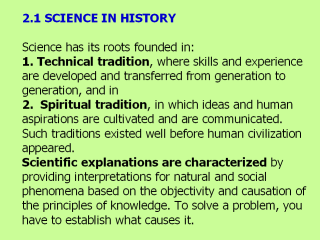| front |1 |2 |3 |4 |5 |6 |7 |8 |9 |10 |11 |12 |13 |14 |15 |16 |17 |18 |19 |20 |21 |22 |23 |24 |25 |26 |27 |28 |29 |30 |31 |32 |33 |review |
 |
The purpose of scientific comprehension
is to orient our interrelations with the world and with other people, giving
us the capability to interact with nature and society. Nonetheless, such
purpose and functions for science has changed. During the XVIIIth to XIX
centuries, it was thought that humans have domain over nature and are
entitled to put it their service, in spite of the deterioration and
destruction of the environment and resources. The primordial aim of Greek science from the XIth century BC through the IInd century AC was to seek an explanation for principles of the real world, and this was carried out without any intention of transforming nature, or to have it “serve” humankind. The purpose of such scientific explanations was to provide the intellectual elite with arguments and resources to satisfy their expectations of knowledge. However, during those early times, knowledge so acquired was never applied to the practical uses, as we do now. The philosopher was a wise man who had nothing to do with the laborer’s world. His reflections were about “the first principles and fundamental cause.” The latter means what gives rise and origin to everything that exists, attempting to go beyond itself, seeking for a “cause” exterior to the subject itself which explains and governs it, but does not reside within the subject itself (the Uncaused cause, the Immobile motor, as referred to by Aristotle). Explanations for the world and humans appear as “set there” by a deity or by a necessary and unperceived motion of reality, always taking part of a “Cosmos” with a necessary, predetermined, and unchangeable order. Such a vision of the world as an ordained structure, in which each thing has a unique and exclusive place, was maintained during the middle ages, IXth to XVIth centuries. The belief in a “natural order” cause-principle, an idea from the Greeks and reclaimed and maintained by monks and clerics, considered God as the origin and His will as sense for the function of the whole universe. The development of the philosopher was the particular tutor’s responsibility, and took place in the way of schools only in the later stages. For pursuing personal interests, acquiring argumentative capacity for tournaments or exercising social power, such development took place at schools such as the Pythagorean Academy, Plato’s Academy, and the Schools of Sophists. |